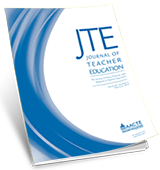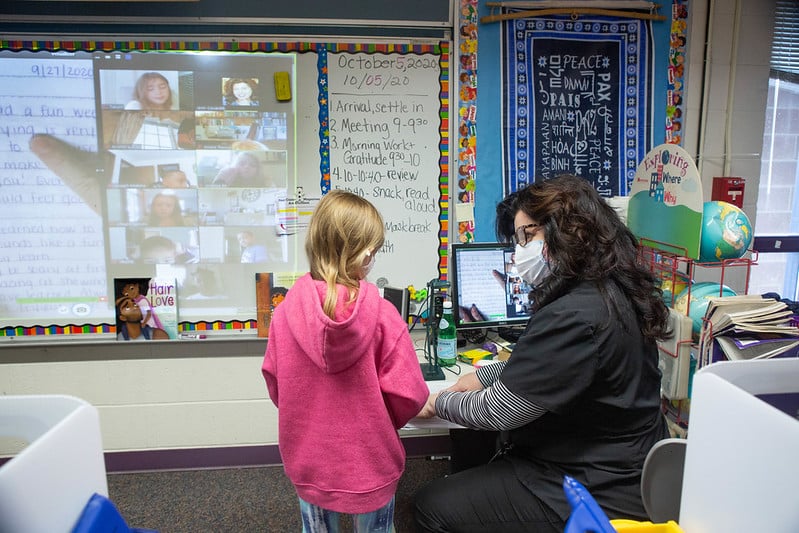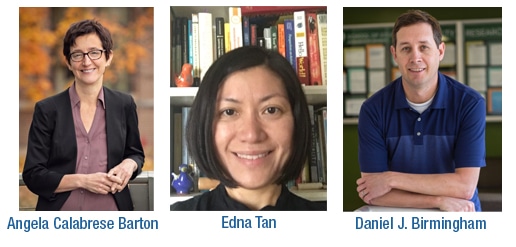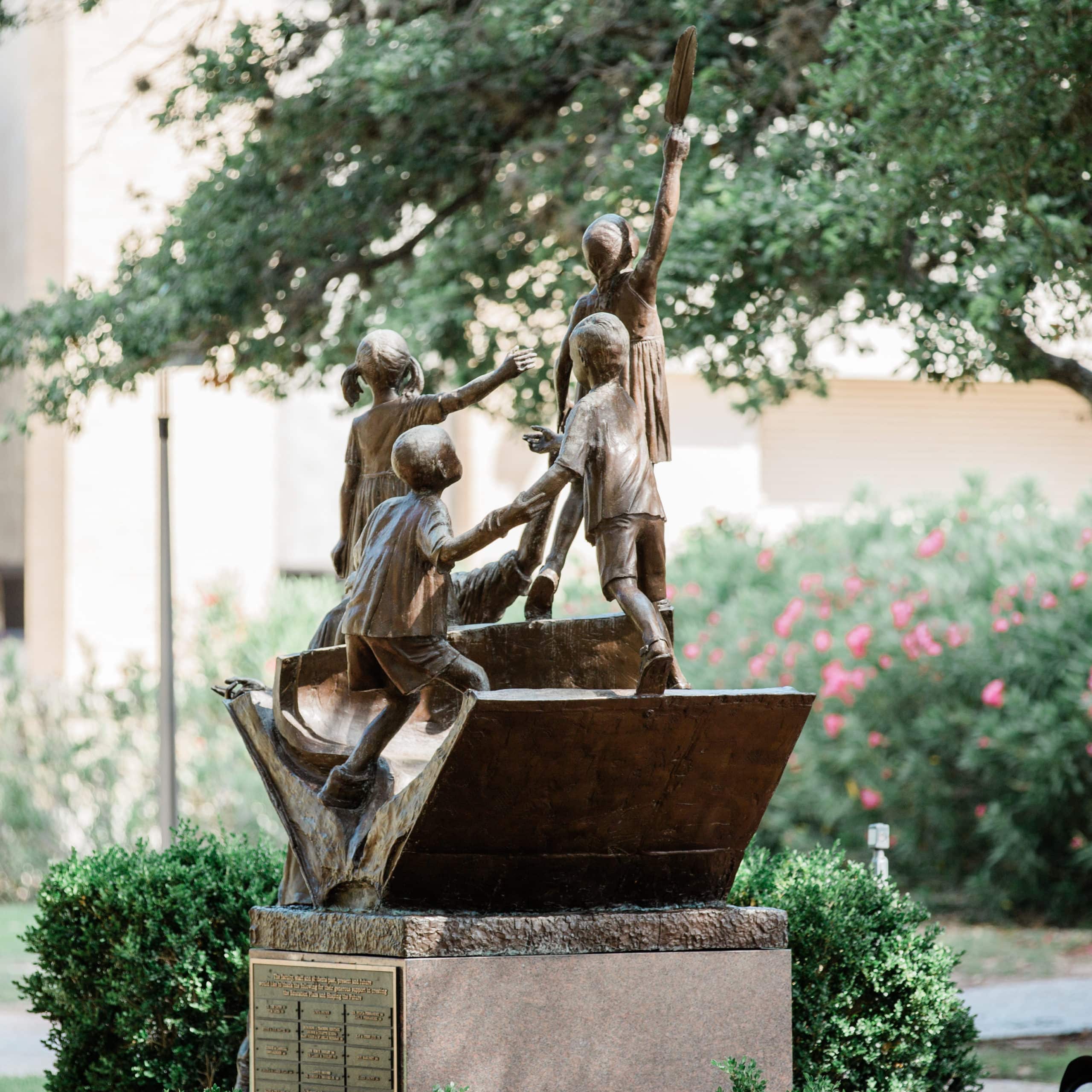06 Apr2021
By JTE Insider
 Listen to the recent JTE Insider podcast by the Journal of Teacher Education (JTE) editorial team. This blog is available to the public, and AACTE members have free access to the articles in the JTE online archives—just log in with your AACTE profile.
Listen to the recent JTE Insider podcast by the Journal of Teacher Education (JTE) editorial team. This blog is available to the public, and AACTE members have free access to the articles in the JTE online archives—just log in with your AACTE profile.
This podcast interview features insights from the article “Examining Preservice Teachers’ Perceptions of Planning for Culturally Relevant Disciplinary Literacy“ by Dr. Jamie Colwell, Kristen Gregory, and Valerie Taylor. The article was published in the March/April 2021 issue of the Journal of Teacher Education.
Article Abstract
This qualitative multiple case study examined four preservice teachers’ planning and perceptions of planning for culturally and socially relevant disciplinary literacy instruction in secondary disciplines. Four disciplines were represented: art, English, history, and physical education (P.E.)/health. This research sought to understand how a secondary literacy course and its requirements, with a particular focus on culturally relevant disciplinary literacy (CRDL) instruction. Particularities of the four disciplines of study represented were also considered to inform cross-content literacy coursework. Findings indicated preservice teachers (PSTs) recognized potential of CRDL to engage students in critical thought. However, core disciplines (English and history) had varying viewpoints of the reality of such instruction compared with noncore disciplines (art and P.E./health), and all PSTs struggled to perceive CRDL as a primarily student-focused approach to instruction.
06 Apr2021
By JTE Insider

Check out a recent JTE Insider blog interview by the Journal of Teacher Education (JTE) editorial team. This blog is available to the public, and AACTE members have free access to the articles in the JTE online archives—just log in with your AACTE profile
This interview features insights from the article “Becoming Clinically Grounded Teacher Educators: Inquiry Communities in Clinical Teacher Preparation“ by Rachel Wolkenhauer and Angela Hooser. The article was published in the March/April 2021 issue of the Journal of Teacher Education. .
Article Abstract: Calls for the renewal of teacher preparation through clinical practice have left many novice teacher educators to learn on the job. This article reports on the research of two such novices, studying their own practice. Addressing the need to better understand the approaches teacher educators take to clinically grounding their work, the authors used a hermeneutic approach to naturalistic inquiry to study their use of an inquiry community framework in a teacher preparation clinical setting. The authors found that within an arc of practitioner inquiry, explicitly teaching guided reflection and professional dialoguing skills within an inquiry community were key teacher educator practices. They found that an inquiry community approach holds promise as a structure and space for teacher educators to advance teacher preparation toward clinical practice.
03 Apr2021
By The Wallace Foundation
Learn about the findings from a new, comprehensive study commissioned by The Wallace Foundation, The Role of Assistant Principals: Evidence and Insights for Advancing School Leadership. Based on two decades of research, the synthesis focuses on a role that is increasingly prevalent but often overlooked. The report suggests APs could become a more powerful force in advancing equity, student outcomes, and school leadership goals.
The Role of Assistant Principals: A New Synthesis Offers Evidence and Insights
Tuesday, April 13, 2021 from 1:00 – 2:00 p.m. ET via Zoom
We invite you to register for this important, one-hour event.
30 Mar2021
By Gaelle Gilbert
 AACTE was recently cited in the New York Times article, “As Pandemic Upends Teaching, Fewer Students Want to Pursue It,’ published in the weekend digital and print edition. NYT writer Emma Goldberg highlights AACTE’s findings from its member survey and includes quotes from Board members Marvin Lynn and Marquita Grenot-Scheyer, David Chard from AACTE-member institution Boston University Wheelock School of Education, as well as students from two other AACTE member institutions.
AACTE was recently cited in the New York Times article, “As Pandemic Upends Teaching, Fewer Students Want to Pursue It,’ published in the weekend digital and print edition. NYT writer Emma Goldberg highlights AACTE’s findings from its member survey and includes quotes from Board members Marvin Lynn and Marquita Grenot-Scheyer, David Chard from AACTE-member institution Boston University Wheelock School of Education, as well as students from two other AACTE member institutions.
The article references AACTE’s two-part member survey that chief representatives of its member institutions responded to about how the twin crises of COVID-19 and racial injustice had affected their educator preparation programs and how they have responded to these crises. The results were included in a report by Jacqueline King released in February.
30 Mar2021
By Bart Epstein
The U.S. federal government, states, and school districts collectively spend between $26 and $41 billion per year on education technology materials, according to a new analysis released today by a coalition of education nonprofits led by the EdTech Evidence Exchange. These estimates reflect a troubling lack of understanding about how much the country actually spends on edtech, and also suggest that even according to the lowest estimates, the country spends at least twice the $13 billion figure often previously cited by industry analysts and policymakers.
“We are spending billions of dollars on technology with almost no information about which tools actually work, where, and why,” said Bart Epstein, CEO of the EdTech Evidence Exchange and a research associate professor at the University of Virginia School of Education and Human Development. “We know that technology can have a profound impact on educational outcomes, but thousands of tools and programs used by schools are creating confusion for educators and administrators, not to mention students and parents. When poorly selected or implemented, they waste teacher time and energy and rob students of learning opportunities. Making good on the transformative potential of education technology starts with listening to, and learning from, people who are actually using it.”
12 Mar2021
By Rebecca West Burns
The American Educational Research Association (AERA) Professional Development School Research Special Interest Group (SIG) in partnership with Georgia State University (GSU) has received a Research Conference Grant Award from AERA. The purpose of the grant award is to support a three-day conference in September of 2021 on advancing PDS research and creating a collaborative national research agenda. Researchers, scholars, scholar-practitioners and doctoral students from different regions of the country, representing diverse perspectives, and varied domains of inquiry will be invited to present their visions, views, theories, research and research approaches. The conference will be in-person at GSU and remote for a number of individuals starting on Friday, September 17 through Sunday, September 19.
12 Mar2021
By John McDonald

This article originally appeared in Ampersand, the UCLA Ed & IS online magazine, and is reprinted with permission.
The Center for the Transformation of Schools at the UCLA School of Education and Information Studies is launching a new research initiative to inform and strengthen efforts to increase the racial, cultural and linguistic diversity of educators in California.
The project will bring together expert researchers and K-12 and higher education representatives from a variety of backgrounds to examine and identify the factors that fuel the gap in the racial identity of California’s educators and the students they serve. The research will produce an evidence-based landscape study of the challenge, as well as additional research and policy briefs that build public awareness and set forth strategies and models for state and local efforts to increase the diversity of the education workforce. The project is funded by a grant from the William & Flora Hewlett Foundation and from the Bill & Melinda Gates Foundation as part of a national effort to increase educator diversity.
08 Mar2021
By UTRGV
The University of Texas Rio Grande Valley (UTRGV) is among the top universities to produce the largest number of teachers in Texas, and has among the highest retention rates, according to the 2020 Performance Analysis for Colleges of Education (PACE) study.
The study’s results are from research generated at the University of Houston’s Center for Research, Evaluation, & Advancement of Teacher Education (CREATE).
“Retention of novice teachers in the profession is a very important measure of success for teacher preparation programs given the huge numbers of teachers that leave the profession every year contributing to the tremendous teacher shortage in the state,” said Alma Rodriguez, dean of the UTRGV College of Education and P-16 Integration.
The PACE report also shows that graduates from the UTRGV teacher preparation program have a 91%, 5-year retention rate in the teaching profession. The rate was calculated through a five-year study (from 2015 to 2019) of first-year teachers who graduated from the different educator preparation programs in the state of Texas.
08 Mar2021
By JTE Insider
 Listen to the recent JTE Insider podcast by the Journal of Teacher Education (JTE) editorial team. This blog is available to the public, and AACTE members have free access to the articles in the JTE online archives—just log in with your AACTE profile.
Listen to the recent JTE Insider podcast by the Journal of Teacher Education (JTE) editorial team. This blog is available to the public, and AACTE members have free access to the articles in the JTE online archives—just log in with your AACTE profile.
This podcast interview features insights from the article “What Do Surveys of Program Completers Tell Us About Teacher Preparation Quality?,” by Kevin Bastion, Min Sun, and Heather Flynn. The article was published in the January/February issue of the Journal of Teacher Education.
02 Mar2021
By Weade James
During AACTE’s 73rd Annual Meeting last week, Pricella Morris, Phllandra Smith, and Moe Green were announced as recipients of the 2021 Holmes Program Dissertation Funding Competition (DFC).
Over the last four years, AACTE has held an annual Holmes Program DFC to support Holmes scholars’ dissertation research related expenses. This annual event is sponsored by AACTE and its partners, including the Council of Academic Deans from Research Education Institutions (CADREI), Teacher Education Council of State Colleges and Universities (TECSCU), the Association of Independent Liberal Arts Colleges of Teacher Education (AILACTE), and the National the National Association of Holmes Scholars Association (NAHSA).
25 Feb2021
By Katrina Norfleet
 AACTE is pleased to announce Sarah “Mia” Obiwo as the recipient of the 2021 AACTE Outstanding Dissertation Award for “Bringing Clarity to the Construct: A Content Analysis of Disposition for Urban Teaching and Learning.” The author completed her dissertation for the Ph.D. at Georgia State University, and she currently serves as assistant professor of early childhood education at the University of Memphis. She is being presented with the award at today’s virtual AACTE 73rd Annual Meeting Awards Forum.
AACTE is pleased to announce Sarah “Mia” Obiwo as the recipient of the 2021 AACTE Outstanding Dissertation Award for “Bringing Clarity to the Construct: A Content Analysis of Disposition for Urban Teaching and Learning.” The author completed her dissertation for the Ph.D. at Georgia State University, and she currently serves as assistant professor of early childhood education at the University of Memphis. She is being presented with the award at today’s virtual AACTE 73rd Annual Meeting Awards Forum.
25 Feb2021
By Katrina Norfleet

AACTE is pleased to announce authors of the article, “Rethinking High-Leverage Practices in Justice-Oriented Ways,” as the recipient of the 2021 AACTE Outstanding Journal of Teacher Education Article Award. Published in the September/October 2020 issue of the journal, the authors of the article, Angela Calabrese Barton of University of Michigan, Edna Tan of University of North Carolina at Greensboro, and Daniel J. Birmingham of Colorado State University are being presented with the award at today’s virtual AACTE 73rd Annual Meeting Awards Forum.

“There is much to admire and value about the scholarship that Calabrese Barton, Tan, and Birmingham report in this award-winning piece,” said Elizabeth Birr Moje, dean of the School of Education, University of Michigan. “Their ambitious pursuit of justice-oriented teaching practice, conducted in partnership with teachers, makes invaluable contributions to our understanding of how educators engage in socially transformative teaching.”
22 Feb2021
By Jerry Berberet
The Journal for Success in High-Need Schools, is seeking articles and columns for its Volume 16, Number 2, Issue theme – “Education in a Pandemic Age: Evolution or Transformation?”
The COVID-19 pandemic is the latest and by far the most severe of several pandemics (e.g., HIV, SARS, MERS, Ebola) global society has experienced in recent decades. COVID-19 has dramatically affected all sectors of education and society, including teaching and learning; how schools are structured; student, teacher, and parent/family relationships; and has thrust eLearning front and center in all aspects of education. In shuttering virtually all schools and colleges and with nearly all students “sheltering in place,” COVID-19 transformed, at least in the short term, the trajectory of the decades-long evolution of online and distance learning. As teachers scramble to develop their classes online and schools struggle to make technology more widely available, families must adjust to new realities with children at home. Already there are wider impacts on work, leisure, and family life, not to mention jobs, careers, social organization, governance, international relations, and the global economy. The timing and magnitude of these changes are open to speculation, but it appears that at some level they will be long lasting, even as the duration of COVID-19 and the likelihood of future pandemics on our complex, highly interactive Earth society are unclear.
13 Feb2021
By JTE Insider

Listen to the recent JTE Insider podcast by the Journal of Teacher Education (JTE) editorial team. This blog is available to the public, and AACTE members have free access to the articles in the JTE online archives—just log in with your AACTE profile.
This podcast interview features insights from the article “Historians, Archivists, and Museum Educators as Teacher Educators: Mentoring Preservice History Teachers at Cultural Institutes,” by Tim Patterson. The article was published in the January/February issue of the Journal of Teacher Education.
04 Feb2021
By Jacqueline Rodriguez
 AACTE is pleased to announce the College of Education and Human Development at the Texas A&M University, as the next home to the Journal of Teacher Education (JTE) editorial team. The editors were selected through a rigorous peer-review process and approved for a 3-year term, beginning in 2021, which can be extended for an additional 3 years.
AACTE is pleased to announce the College of Education and Human Development at the Texas A&M University, as the next home to the Journal of Teacher Education (JTE) editorial team. The editors were selected through a rigorous peer-review process and approved for a 3-year term, beginning in 2021, which can be extended for an additional 3 years.
The current editorial team at Michigan State University, which has served the JTE since 2015, will continue work on the journal through June 2021 to complete Volume 72.
“AACTE celebrates Texas A&M in their selection as the next editorial team for our flagship Journal of Teacher Education. Their team of scholars has the demonstrated experience, respect, and vision to lead the journal into its next chapter,” said Lynn M. Gangone, AACTE president and CEO of AACTE. “JTE is steadily increased its impact on the field under the tenure of the current editorial team at Michigan State University. AACTE owes a debt of gratitude to the tremendous editors at MSU, including incoming Board Chair, Dean Robert Floden, Dr. Gail Richmond, Dr. Dorinda Carter, and Dr. Tonya Bartell.”
 Listen to the recent JTE Insider podcast by the Journal of Teacher Education (JTE) editorial team. This blog is available to the public, and AACTE members have free access to the articles in the JTE online archives—just log in with your AACTE profile.
Listen to the recent JTE Insider podcast by the Journal of Teacher Education (JTE) editorial team. This blog is available to the public, and AACTE members have free access to the articles in the JTE online archives—just log in with your AACTE profile.







 AACTE was recently cited in the New York Times article, “As Pandemic Upends Teaching, Fewer Students Want to Pursue It,’ published in the weekend digital and print edition. NYT writer Emma Goldberg highlights AACTE’s findings from its member survey and includes quotes from Board members Marvin Lynn and Marquita Grenot-Scheyer, David Chard from AACTE-member institution Boston University Wheelock School of Education, as well as students from two other AACTE member institutions.
AACTE was recently cited in the New York Times article, “As Pandemic Upends Teaching, Fewer Students Want to Pursue It,’ published in the weekend digital and print edition. NYT writer Emma Goldberg highlights AACTE’s findings from its member survey and includes quotes from Board members Marvin Lynn and Marquita Grenot-Scheyer, David Chard from AACTE-member institution Boston University Wheelock School of Education, as well as students from two other AACTE member institutions.
 Listen to the recent JTE Insider podcast by the Journal of Teacher Education (JTE) editorial team. This blog is available to the public, and AACTE members have free access to the articles in the JTE online archives—just
Listen to the recent JTE Insider podcast by the Journal of Teacher Education (JTE) editorial team. This blog is available to the public, and AACTE members have free access to the articles in the JTE online archives—just  AACTE is pleased to announce Sarah “Mia” Obiwo as the recipient of the 2021 AACTE Outstanding Dissertation Award for “Bringing Clarity to the Construct: A Content Analysis of Disposition for Urban Teaching and Learning.” The author completed her dissertation for the Ph.D. at Georgia State University, and she currently serves as assistant professor of early childhood education at the University of Memphis. She is being presented with the award at today’s virtual AACTE 73rd Annual Meeting Awards Forum.
AACTE is pleased to announce Sarah “Mia” Obiwo as the recipient of the 2021 AACTE Outstanding Dissertation Award for “Bringing Clarity to the Construct: A Content Analysis of Disposition for Urban Teaching and Learning.” The author completed her dissertation for the Ph.D. at Georgia State University, and she currently serves as assistant professor of early childhood education at the University of Memphis. She is being presented with the award at today’s virtual AACTE 73rd Annual Meeting Awards Forum.
 AACTE is pleased to announce the College of Education and Human Development at the Texas A&M University, as the next home to the Journal of Teacher Education (JTE) editorial team. The editors were selected through a rigorous peer-review process and approved for a 3-year term, beginning in 2021, which can be extended for an additional 3 years.
AACTE is pleased to announce the College of Education and Human Development at the Texas A&M University, as the next home to the Journal of Teacher Education (JTE) editorial team. The editors were selected through a rigorous peer-review process and approved for a 3-year term, beginning in 2021, which can be extended for an additional 3 years.